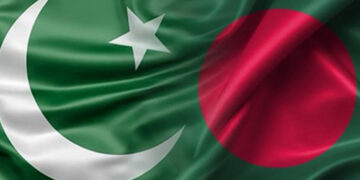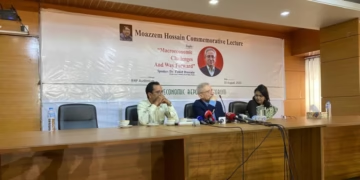BGMEA President Mahmud Hasan Khan Babu welcomed the U.S. tariff cut on Bangladeshi exports from 35% to 20%, calling it a relief after months of uncertainty. He warned of short-term business impacts but noted Bangladesh now has a competitive edge over India and China. He urged buyers to bear the tariff burden and stressed the need to fulfill all trade commitments to avoid future risks.
Speaking on the recent U.S. tariff decision, Bangladesh Garment Manufacturers and Exporters Association, BGMEA President Mahmud Hasan Khan Babu expressed relief over the reduction in countervailing duty from 35% to 20% on Bangladeshi exports, especially in the ready-made garment sector.
“For the past three months, we were stuck in a state of uncertainty regarding the counter-tariff. Doing business in such conditions is extremely difficult,” said the BGMEA President. “Even our U.S. buyers were closely watching the situation unfold. The final decision to reduce the duty to 20% is definitely a relief for us.”
He emphasized that from the beginning, Bangladesh had raised concerns that higher tariffs compared to competing countries would make business tough. While the revised tariff is still 1% higher than Pakistan’s, it’s 5% lower than India’s and 10% lower than China’s giving Bangladesh a competitive edge.
Read More: Fire Breaks Out at Sundarban Square Market in Gulistan, 11 Fire Service Units Battling Blaze
“Yes, this extra duty might temporarily affect business. U.S. buyers will have to pay more to import our products, which could strain their capital. If they can’t secure additional financing, they might cut back on orders. Ultimately, it’s the buyers and eventually the end consumers who will feel the pressure of these tariffs. If prices rise due to the duty, consumer demand might drop.”
He also reflected on how the first round of counter-tariffs—introduced in April by the Trump administration imposed a minimum of 10% duty on all countries. Some U.S. buyers managed the extra cost by negotiating with suppliers, and in some cases, Bangladeshi exporters had to absorb a portion of that burden.
“I want to send a clear message to all BGMEA members: the burden of these tariffs must be carried by the importing companies and buyers—not our exporters. At the end of the day, these costs are passed on to the American consumers. That message needs to be clear and consistent.”
The BGMEA President further pointed out that China still faces a 30% countervailing duty, and the final rate may soon be officially announced by the U.S. president. Based on current indications, China’s tariff rate won’t be lower than Bangladesh’s. This opens up an opportunity for Bangladesh, as global buyers may continue to shift orders away from China.
“To seize this opportunity, we need consistent energy supply, increased capacity at Chattogram port, and above all, political stability,” he said.
While the full draft or summary of the tariff agreement hasn’t yet been disclosed, he expressed hope that the Bangladeshi trade delegation has signed the deal while safeguarding national and commercial interests.
Finally, he stressed the importance of Bangladesh fulfilling all the commitments made during tariff negotiations.
“Some of these promises are short-term, like importing wheat, cotton, or LNG, while others like purchasing aircraft are long-term. We must remember: any failure to honor these commitments could bring us back into trouble.”


















